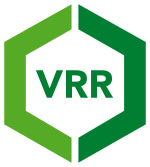Verkehrsverbund Rhein-Ruhr
The Verkehrsverbund Rhein-Ruhr (German: [fɛɐ̯ˈkeːɐ̯s.fɛɐ̯ˌbʊnt ˈʁaɪn ˈʁuːɐ̯]), abbreviated VRR, is the public transport association covering the area of the Rhine-Ruhr conurbation in Germany. It was founded on 1 January 1980, and is Europe’s largest body of such kind, covering an area of some 5,000 km² with more than seven million inhabitants, spanning as far as Dorsten in the north, Dortmund in the east, Langenfeld in the south, and Mönchengladbach and the Dutch border in the west.

Total passengers transported

In 2004, roughly 1 billion trips were made by way of the VRR network.
Mode of transport

With the introduction of the VRR in 1980 a new line numbering systems for all bus, tram and Stadtbahn lines in the VRR area was introduced. The VRR was divided into ten sections getting a key number (e.g. 4 for Dortmund), the first number in the three-digit line numbers represents these key numbers. The last two numbers are the actual identifying numbers. These are the key numbers:
- 1: Essen, Mülheim
- 2: Kreis Recklinghausen, Bottrop
- 3: Bochum, Gelsenkirchen, Witten
- 4: Dortmund
- 5: Hagen, Ennepe-Ruhr-Kreis
- 6: Wuppertal, Solingen, Remscheid
- 7: Düsseldorf right of the Rhine
- 8: Düsseldorf east of the Rhine and surrounding areas
- 9: Duisburg, Oberhausen
- 0: Mönchengladbach, Krefeld
- no key number: Kleve (district), Wesel (district)
Stadtbahn lines are identified with the prefix "U" followed by the key number and a one-digit identifying. The key numbers 2, 5, 8, 9 and 0 are not used for Stadtbahn lines, but the Düsseldorf Stadtbahn is planning is approaching 10 lines in 2016, all new lines afterwards will get the 8 key number. The Wuppertal Schwebebahn is officially called line 60, but because it does not run underground, the U prefix is not used.
After the integration of the Niederrhein area north of Duisburg, a new section for key numbers was introduced; the buses have a one- or two-digit number with no key number for identification.
There are several exceptions of that system, also, there some extra line numbers e.g. for express buses:
- Express buses are called Schnellbus and have the prefix SB followed by a two-digit-number. None of these numbers is a key number.
- Semi-fast buses are called City-Express and have the prefix CE followed by a two-digit-number. As with the Schnellbusse none of these numbers is a key number.
- Taxi buses are AST – AnrufSammelTaxi or ALT – AnrufLinienTaxi or Taxibus
- In some cities the local buses have an own numbering system, e.g. the buses in Velbert are called Ortsbus, their line number consists of an OV followed by a one- or two-digit number.
- In some cities the night buses are called NachtExpress – NE
As of 2012, the VRR network consists of 978 lines,[1] of which there are:
- in regional rail transit
- 11 S-Bahn lines[1] (see: Rhine-Ruhr S-Bahn)
- 15 RegionalExpress lines[1] (see: List of regional railway lines in North Rhine-Westphalia)
- 24 RegionalBahn lines[1] (see: List of regional railway lines in North Rhine-Westphalia)
- in local rail transit
- 19 Stadtbahn light rail lines[1] (see: Rhine-Ruhr Stadtbahn)
- 45 streetcar (Straßenbahn) lines[1]
- 1 Schwebebahn line[1] (in Wuppertal)
- 2 H-Bahn peoplemover systems[1] made up of three lines (two H-Bahn lines in Dortmund, and the Düsseldorf SkyTrain at Düsseldorf airport)
- in bus transit
- 906 bus lines,[1] including
- 33 express bus lines (Schnellbus, SB)
- 18 semi-fast bus lines (CityExpress, CE)
- 6 trolleybus lines[1] (in Solingen)
- 906 bus lines,[1] including
- 15,300 km of route network[2] (bus, light rail, and train)
- 11,500 transit stops
Associated transport companies
|
|
Selected cities and parishes in the VRR area
|
Additionally, the VRR tariff is recognized on the following lines outside the VRR area:
- Aachener Verkehrsverbund
- Heinsberg (district)
- Wegberg (only bus line 017 from Mönchengladbach)
- Heinsberg (district)
- Verkehrsgemeinschaft Münsterland (all lines, but only while traveling from/to the VRR area)
- Verkehrsgemeinschaft Ruhr-Lippe
- Unna (district) (all lines, but only if VRL tariff is not possible)
- Märkischer Kreis
- Nachrodt-Wiblingwerde (only bus line 539)
- the Netherlands
- Province Gelderland
- Arnhem (only RE 19)
- Millingen aan de Rijn (only bus line 60)
- Nijmegen (only bus line SB 58)
- 's-Heerenberg (only bus line 91)
- Zevenaar (only RE 19)
- Province Limburg
- Province Gelderland
See also
References
- "Verbundbericht 2012/2013 als Blätterkatalog" [Network Report 2012/2013 as a Page-by-page Catalog] (in German). Verkehrsverbund Rhein-Ruhr (VRR). p. 107. Retrieved 2013-10-23.
- "Verkehrsverbund Rhein-Ruhr - Homepage - Welcome to the VRR". Verkehrsverbund Rhein-Ruhr (VRR). Retrieved 2013-10-23.
External links
![]()
- Verkehrsverbund Rhein-Ruhr (VRR) – official site (in English)
- Verkehrsverbund Rhein-Ruhr (VRR) – official site (in German)